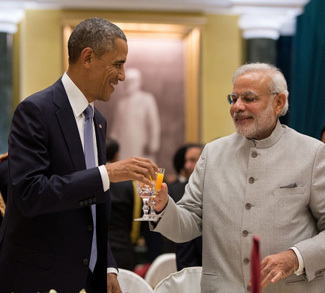
El Salvador gang members inside the new state super max prison
In this exclusive article for Geopoliticalmonitor, photographer Jonathan Alpeyrie discusses the drug war in El Salvador. All photographs are taken by Alpeyrie on assignment unless otherwise stated, and all photographs are published with his permission.
For decades, the small Central American nation of El Salvador was known for two things: A hard fought proxy war between 1979 and 1992, and later, the taking over of the country by numerous gangs reigning supreme through violence and the drug trade.
Today, El Salvador is a different country. With the coming into power of the current president Nayib Bukele and his hard-right government, El Salvador is the safest country in Central America. Over the past year and a half, the Bukele government has launched a merciless offensive against the various Maras criminal gangs which were in control of a large swath of the country. Indeed, the 75,000-strong criminal gangs which had been paralyzing El Salvador via their criminal activities were devastated by the use of military operations designed to surprise in both their efficiencies and brutal tactics. No one truly knows how many gang members were killed during these clean-up operations; however, it is safe to say that the number lies in the thousands. The rest, the ones who survived and surrendered to the authorities, were promptly sent to the new supermax prison built by the government specifically designed to house tens of thousands of these hardened criminals. The prison, better known officially as “the terrorism confinement center,” holds today around 60,000 inmates. All will receive at some point a lifelong sentence, meant to permanently get rid of all gang members within El Salvador. In fact, the Bukele government has just passed a law which allows the judicial system to convict 900 criminals at once, hence facilitating the process to keep these inmates behind bars until their natural death.

A few remaining pockets have remained in the capital where remnants of criminal organizations try to survive. This has become increasingly impossible as the army and police are routinely cracking down on them in San Salvador. (San Salvador, El Salvador, July 27, 2023)
Not everyone is happy about this rather heavy-handed approach. Numerous press organizations, NGOs, the UN and other human rights outfits have criticized the Bukele government for using such practices. But these criticisms have fallen on deaf ears. In fact, the Salvadoran government has expressed publicly no interest in responding to such accusations, which are seen as nothing more as unfounded distractions. Since his election into power in June 2019, Bukele has kept his campaign promise to make El Salvador the safest country in Central America. He, so far, as succeeded with flying colors: the success of his policies have had strong ripple effects throughout the Americas, drawing intense attention toward the tiny Central American nation. In recent months, the countries of Guatemala, Honduras, and Mexico have sent numerous emissaries to study the Bukele method, trying to learn how some of these tactics could be used within their respective borders to tackle the criminalization of their own countries. Ecuador, Peru, and Paraguay have also expressed interest.

(San Salvador, El Salvador, July 27, 2023)
Like with every strong stance on crime and corruption, this all comes at a price. In searching for a fine-tuned balanced between a heavy-handed approach and private liberties, the Salvadoran government must aim for the point where the population feels safe enough to live their normal lives, while creating a prosperous landscape for both domestic and foreign investments. One worry consistently expressed by NGOs is that the Bukele government is tempted by a form of dictatorial set up where judicial, military and police institutions will eventually restrict people’s liberties in the public sphere. For instance, president Bukele has expressed a strong interest to use China to help consolidate gains and make sure that crime does not flourish once more. To this end, the Salvadoran government is currently in the process of ordering thousands of facial-recognition cameras from China, which will be set up throughout the country. For some, this is a clear sign of dictatorial control, but for others, it’s the price to pay in order to keep the country safe over the long haul and hence give El Salvador the time necessary time and chance to prosper.

(San Salvador, El Salvador, July 27, 2023)
Whether or not there are some clear sings of authoritarian tendencies, an overwhelming portion of Salvadorians, both within the country and abroad, approve of what the Bukele government has done so far. The reality on the ground can surely attest to that fact as it has become safe to move from one neighbored to the next, go out at night and visit friends, and even travel within the country. A year and a half ago, these prospects that we take for granted were always a dangerous proposition, as the various criminal gangs operating and controlling different areas would not permit such ease of movement. Families can now enjoy their front yard or stoops without having to fear being extorted, or at worst killed.

(San Salvador, El Salvador, July 27, 2023)
Now that the current government has won the war against drug groups, can it win the peace and launch El Salvador toward long-term prosperity? So far, as one can tell, the government is clamping down on any corruption which does not align with government policy. Many new state-of-the-art government buildings like the ministry of defense HQ are a testament to this. Indeed, once inside the high-tech building, government workers wearing modern blue clad uniform resembling airline flight attendants can be seen going about their official business. This new image of professionalism and efficiency is purposely shown to foreign media as a clear message that times have changed and that El Salvador is open for business.

The El Salvador Navy has been very active on the Pacific Coast trying to block any drugs, mostly cocaine, coming from Peru and Colombia. (Punta San Juan, Ursulatan, July 24, 2023)
These trends are better understood to the foreign eye as the Bukele government is moving closer to China for both investment and technological expertise. The US government does not see this move as constructive as the USA wants to keep its backyard free of Chinese influence. And on the other side, the Bukele government is far less interested in maintaining good relations with the US government in the Biden era as it was when Trump was in power.
About Jonathan Alpeyrie…
Born in Paris in 1979, Jonathan Alpeyrie moved to the United States in 1993. He graduated from the Lycée Français de New York in 1998, and went on to study medieval history at the University of Chicago, from which he graduated in 2003. Alpeyrie started his career shooting for local Chicago newspapers during his undergraduate years. He shot his first photo essay in 2001 while traveling the South Caucasus. After graduating, he went to the Congo to work on various essays, which were noticed and picked up by Getty Images, and signed a contributor contract in early 2004. In 2009, Jonathan became a photographer for Polaris images and SIPA press as well. Alpeyrie has worked as a freelancer for various publications and websites, such as the Sunday Times, Le Figaro magazine, ELLE, American Photo, Glamour, Aftenposten, Le Monde, BBC, and today he is a photographer for Polaris Images, with whom he signed in February 2010. His career spans over a decade, and has brought him to over 25 countries, covering 14 conflict zones assignments, in the Middle East and North Africa, the South Caucasus, Europe, North America and Central Asia. A future photography book about WWII is in the works.
Alpeyrie published a book with Simon and Schuster in October 2017.
Alpeyrie has been published in magazines such as: Paris Match, Aftenposten, Times (Europe), Newsweek, Wine Spectator, Boston Globe, Glamour, BBC, VSD, Le Monde, Newsweek, Popular Photography, Vanity Fair, La Stampa, CNN, and Bild Zeit, ELLE magazine, Der Speigel, Le Figaro, Marie Claire, The Guardian, Bild, The Atlantic, Bloomberg, Financial Times.



